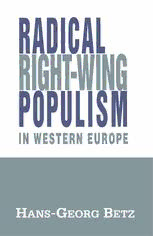
Radical Right-Wing Populism in Western Europe PDF
Preview Radical Right-Wing Populism in Western Europe
RADICAL RIGHT-WING POPULISM IN WESTERN EUROPE Also by Hans-Georg Betz POSTMODERN POLITICS IN GERMANY: The Politics of Resentment RADICAL RIGHT-WING POPULISM IN WESTERN EUROPE Hans-Georg Betz M MACMILLAN © Hans-Georg Betz 1994 All rights reserved. No reproduction, copy or transmission of this publication may be made without written permission. No paragraph of this publication may be reproduced, copied or transmitted save with written permission or in accordance with the provisions of the Copyright, Designs and Patents Act 1988, or under the terms of any licence permitting limited copying issued by the Copyright Licensing Agency, 90 Tottenham Coun Road, London WIP 9HE. Any person who does any unauthorised act in relation to this publication may be liable to criminal prosecution and civil claims for damages. First published 1994 by THE MACMILLAN PRESS LTD Houndmills, Basingstoke, Hampshire RG21 2XS and London Companies and representatives throughout the world ISBN 978-0-333-62809-6 ISBN 978-1-349-23547-6 ((eeBBooookk)) DOI 10.1007/978-1-349-23547-6 A catalogue record for this book is available from the British Library. Design by Acme Art, Inc. NewYork,NY For Sabina CONTENTS List of Tables . Vlll Preface .... .IX 1. Radical Right-Wing Populism and the Challenge of Global Change . 1 2. Resentment as Politics . . . . 37 3. Immigration and Xenophobia 69 4. The Two Faces of Radical Right-Wing Populism .107 5. The Social Bases of Political Resentment .... . 141 6. Political Conflict in the Age of Social Fragmentation . 169 Notes ... .191 Bibliography . 201 Index. . . . .223 LIST OF TABLES 1.1 Electoral Results for Radical Right-Wing Populist Parties 2.1 The Political Origins of the Radical Right-Wing Electorate 2.2 Interest in Politics 2.3 Rating of Political Priorities, Austria, 1992 3.1 Foreign Residence in the EC 3.2 Asylum Seekers and Refugees in Western Europe 3.3 Opinions ofEC Citizens on the Presence of Non-EC Citizens, Migrants, and Racist Movements in the EC 3.4 German Attitudes toward Various Immigrant Groups 3.5 The Social Basis of Xenophobia 3.6 Norwegian Voters' Views on Immigrants 5.1 The Gender Basis of Radical Right-Wing Populist and Left-Libertarian Parties 5.2 Age Composition of New Democracy (1991) and Norwegian Progress Party (1989) Voters 5.3 Percentage of Electorate Voting for Front National (1993) and Republikaner (1992) by Age Distribution 5.4 Class Composition of Those Supporting the Danish Progress Party 5.5 Support for the Danish Progress Party, by Education 5.6 Social Base of Front National Voters, 1993 5.7 Social Composition of Automobile Party Voters, 1991 5.8 Social Composition of Norwegian Progress Party Voters, 1989 5.9 Social Composition ofLega Nord Voters, 1991 5.10 Percentage of Population Favoring the Republikaner Party, 1989/1990, by Social Base 5.11 Social Composition of Republikaner Support, Baden-Wiirttemberg State Election, April 1992 6.1 Attitudes toward Immigrants and Foreign Residents PREFACE This book grows out of a long interest in the economic, social, and cultural transformation in Western Europe. I first started to think about its conse quences for West European politics when I thought about the origins of the German Greens in the late 1980s. During my research I had the opportunity to talk to Harald Neubauer, at the time the general secretary of a little known, mostly Bavarian party, the Republikaner. The result was an article on the politics of resentment in Germany and a chapter in my book on "postmodern politics in Germany" in which I tried to show that both Greens and Republika ner were the products of larger changes in German society. During my work on the Republikaner I became increasingly interested in similar parties in other parts of Western Europe. When I had the chance to live in Italy for two years in the early 1990s I had the opportunity to witness first hand the dramatic rise of the Lega Nord in northern Italy. This book deals primarily with the political aspects of radical right-wing populism and its causes in Western Europe. Those who search for answers accounting for the growing violence against foreigners or the spread of neo-naz ism among young people will be disappointed. As heinous and deplorable as these phenomena are, they are the acts of relatively small minorities in Western Europe. By contrast, radical right-wing populist parties have attracted sizeable portions of the West European population; their deputies and representatives sit in local, regional, national, and European parliaments, their leaders have appeared as guests on talk shows. This book is an attempt to explain how it was possible that hardly forty-five years after the end of the Second World War the radical Right could have become a significant factor in West European politics. Initial financial support for this project was provided by the Bradley Institute for Democracy and Public Values, Marquette University. I am grateful for its support. I would like to thank my graduate assistant, Ake Densert, for his invaluable help in dealing with Scandinavian sources and Susanne Bennman in giving me her time to translate Danish material. I am particularly grateful to Linda Merrill, who awakened my interest in the French Right. I also want to thank]0rgen GoulAndersen, Marcus]. Schmidt, Marc Swyngedouw, and Peter Ulram for sharing their work and sources with me. Survey data on Norwegian attitudes toward immigrants were provided by the Norwegian Social Science X RADICAL RIGHT -WING POPULISM IN WESTERN EUROPE Data Service, which delivered the data, and the Norwegian Central Bureau of Statistics, which did the field work. I would like to thank Bj0rn Henrichsen and Knut KalgraffSkjak for their help. I would especially like to thank John Felice for his continuous support while I was at the Loyola University Rome Center of Liberal Arts. Final thanks go to my wife, Sabina Bhatia, for her patience and encouragement. It is to her that this book is dedicated.
